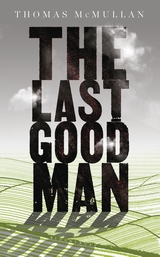The Last Good Man

Duncan Peck has travelled alone to Dartmoor in search of his cousin. He has come from the city, where the fires are always burning.
In his cousin’s village, Peck finds a place with tea rooms and barley fields, a church and a schoolhouse. Out here, the people live an honest life – and if there’s any trouble, they have a way to settle it. They sit in the shadow of a vast wall, inscribed with strange messages. Anyone can write on the wall, anonymously, about their neighbours, about any wrongdoing that might hurt the community. Then comes the reckoning.
The stranger from the city causes a stir. He has not been there long before the village wakes up to the most unspeakable accusation; sentences daubed on the wall that will detonate the darkest of secrets.
A troubling, uncanny book about fear and atonement, responsibility and justice, and the violence of writing in public spaces, The Last Good Man dares to ask: what hope can we place in words once extinction is in the air?
‘A Scarlet Letter for our times’ ― Margaret Atwood
Vividly nasty, recalling the smack-in-the-face technique of early Ian McEwan, and so accomplished that it’s easy to forget this is a debut . McMullan has a sureness with violence that puts him in the company of Sarah Moss and Benjamin Myers. Viciously captivating: frightening to be around, impossible to put aside – a bit like other humans, in fact ― Guardian
This is a visceral and disquieting debut novel about the power of words, and should be read by anyone who uses the internet ― New Statesman
McMullan makes highly effective use of the rugged landscape, full of unease and portents, in his creepily unsettling debut, a timely tale about the dangers of toxic rhetoric and mob rule ― Daily Mail
A brilliantly unsettling parable about how we police our societies through violence, language and shame ― independent.co.uk
Innovative and timeless ― Irish Times
An extraordinary and disquieting work of imagination, and as original as any novel I’ve read in recent memory … The Last Good Man makes visible the dark matter of our troubled zeitgeist, and the cruelty that animates moral community ― Rob Doyle
A clean, crackling novel … McMullan updates Nathaniel Hawthorne’s The Scarlet Letter to today’s sanctimonious climate … An arresting debut about medieval justice that has plenty to say about the dangers of moral puritanism ― Metro
An earthy, gripping piece … A serious and seriously good book ― NB Magazine
McMullan’s skill truly lies in his prose.a startling and evocative tale ― Set the Tape
An unsettling and startling work of literary imagination … A shocking but compulsive read ― ON Magazine
Brilliantly eerie ― Dystopia Junkie
Eerie and atmospheric ― Sunday Post
An essential and commanding slice of folk horror – a wholly successful exercise in world-building that straddles an uncomfortable line between reality and fantasy ― Lunate